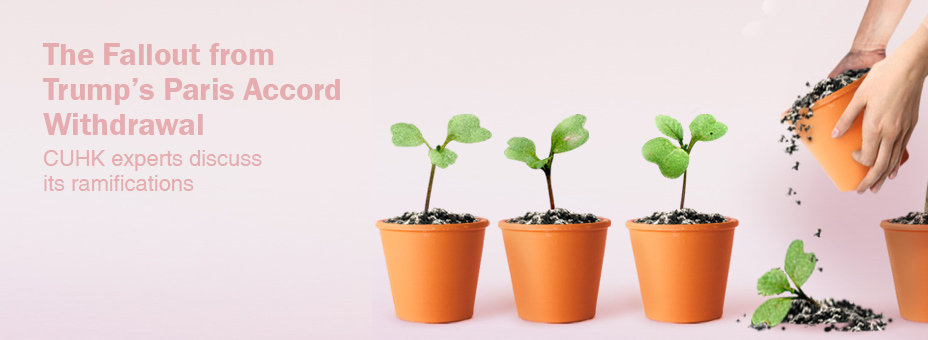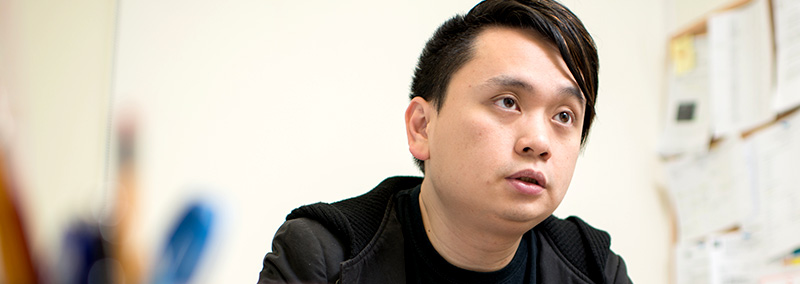
On 1 June, Donald Trump announced in the White House Rose Garden that the US would withdraw from the Paris Agreement on climate change. Critics around the world are blasting Trump for his recklessness, saying that his decision threatens climate stability, global economies, ecosystems and even civilization. CUHK experts also weigh in on what the decision could mean and what comes next.
Gabriel Lau: The Decision is a Serious Setback for Climate Research
When Prof. Gabriel Lau, AXA Professor of Geography and Resource Management at CUHK, heard about the US exit, his first concern falls on the possible impacts on the morale of the climate research community, particularly that in the US. ‘This decision is a serious setback for the efforts of the world community to fight climate change. Throughout the past decades, dedicated scientists in the US have played a prominent role on all fronts of climate change research. They will probably face obstacles in sustaining their research efforts as a result of this decision.’

He went on to say that when the US, the world’s second largest greenhouse gas emitter, abandons the climate deal, it will make it even more difficult to meet the target of limiting global warming to 2°C. ‘Projected climatic responses such as increasing air and sea temperature, rising sea level, melting sea ice and glaciers, and extreme weather events will become increasingly prevalent.’
Trump has repeatedly tweeted and said in campaign speeches that climate change is a ‘hoax’. Professor Lau, who had spent over 40 years studying the issue of climate change in America and was involved with the United Nation’s Intergovernmental Panel for Climate Change, challenges those who still deny global warming to convince him with solid scientific proof. ‘Our views of climate change have to be grounded on rational analysis of the available objective scientific evidence. Projections of climate change are made by applying our knowledge of well-established scientific laws. Observations have confirmed that the climate system is indeed changing in a manner as predicted by these laws.’
Simon Shen: China is Keen to Take the Lead
Simon Shen, associate professor of the Global Studies Programme in the Faculty of Social Science and Co-Director of the International Affairs Research Centre of CUHK, tries to get inside Trump’s head to analyse what aspects of the climate deal run counter to the president’s worldview. ‘According to him, the existing pact gives favouritism to US’s competitors due to their different stages of development, so that some countries benefit from a more relaxed quota whereas the US has to stick to the most rigid one. He also believes that a national government should have full control over domestic issues, e.g., employment, as he should keep his campaign promise made to the blue-collar voters who put him in office.’

Chinese President Xi Jinping has expressed strong support for the Paris accord. Might China be looking to fill the leadership role that the US is vacating? ‘China wishes to be seen as a responsible stakeholder of the world and is keen to take up global leadership proactively,’ said Professor Shen. ‘Claiming moral high ground in the world against US unilateralism would help China extend its hard and soft power. It could also strengthen China’s ties with other powers, especially with the EU.’
The international relations scholar also pointed out that the geopolitical ramifications of US’s departure could spread far and wide. ‘If there are other far-right leaders elected in major developed countries, they might follow Trump’s footsteps. Furthermore, since the Agreement is not legally binding and each country’s commitments are crafted by the country itself, US’s example might offer incentives for some signatories to brush their responsibilities aside in actual practice without officially withdrawing like the US.’
Yam Yeung: The Trend Toward Green Technology is Irreversible

One of the greatest opportunities provided by the Paris Agreement is that it unleashes the expertise and creativity of engineers working in green technologies. Prof. Yam Yeung of the Department of Mechanical and Automation Engineering said the treaty has made it clear that the future belongs to high-tech, low-carbon innovative technologies. ‘Big corporations and start-up companies are all the more motivated to devote their investment in the research and development of such technologies. It will lead to heightened research activities and potential breakthroughs in the field of engineering.’
The climate deal includes an annual Green Climate Fund of US$100bn to finance projects on climate change in developing countries. The bad news is that the US has announced it is no longer committed to contributing the US$2bn it had previously pledged to the Green Climate Fund. ‘While the amount is small compared to the total US$100bn, the decision sets a bad example to other countries in terms of honouring their commitments,’ said Professor Yam.
When asked how bad the US exit will affect the advancement of green technology, Professor Yam takes a rosy view of it: ‘The world economy has started the trend of moving from fossil fuel-based energy sources towards the increasingly affordable renewable energy. It is true that Trump’s policy has curtailed the funding to green technology research on the federal level, yet many states in the US have stepped up their own initiatives on green innovations. Moreover, many big corporations and philanthropists have pledged to increase their financial support to the cause. I would say the damage done by Trump is more due to a blatant emphasis of the short-sighted self-interest of one country over the well-being of the entire world, ignoring the fact that we are all in the same boat.'

The Agreement will not fall apart overnight. Trump also cannot technically begin to withdraw from the Agreement until November 2020 at the earliest. The biological toll of this decision can be countered with good measures around the world and in the US at the level of states and cities. With concerted action, the Paris Agreement can still be relied upon to preserve our precious planet.


